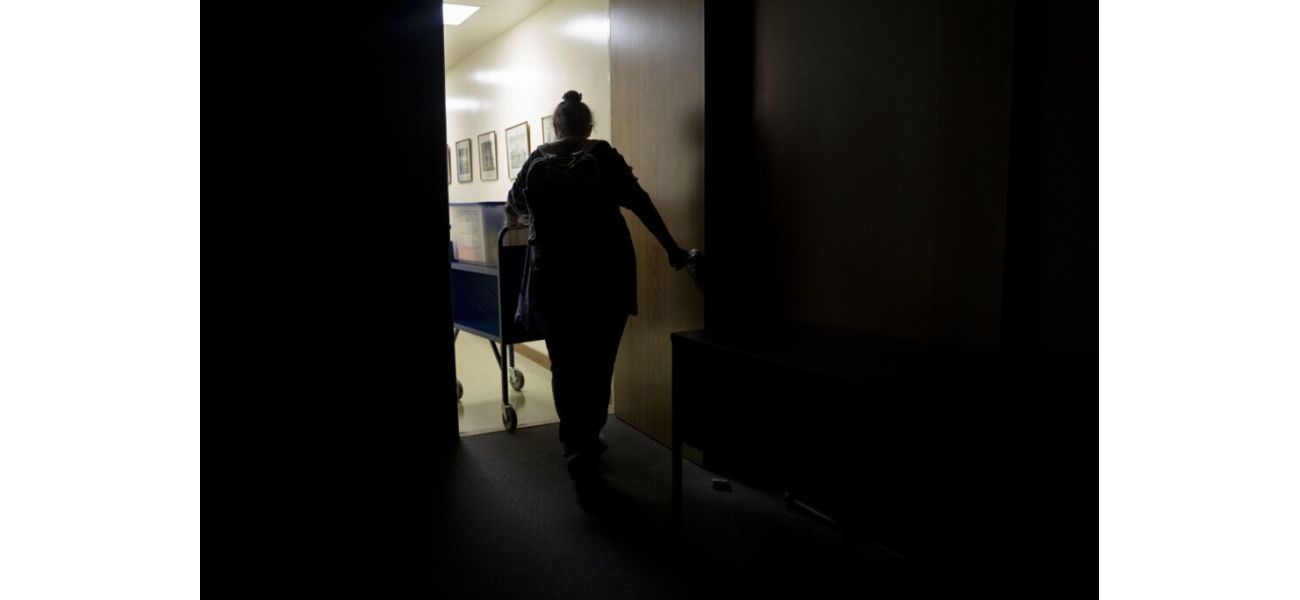AP's reporting reveals shocking child sex abuse within a secretive Christian group.
Idaho's unknown Christian sect struggles with handling abusive leaders and elders over many years.
December 16th 2024.

In Boise, Idaho, a Christian group has been dealing with a troubling issue for many years - abusive leaders and elders. Their approach, however, has been to handle these cases privately, urging victims to forgive their abusers instead of taking legal action. Unfortunately, this "forgiveness" did not put an end to the abuse. Instead, these offenders were often sent to live with other unsuspecting families, where they had easy access to new victims.
But now, thanks to the efforts of survivors, the truth about this scandal has been exposed. They have documented over 900 cases of abuse in 30 different countries, and more continue to emerge. This has brought the previously unknown sect into the public eye and even sparked an FBI investigation. When the Associated Press reached out to current and former members, as well as experts, they found that the allegations were supported by letters, court documents, and other records. However, many leaders and ministers either refused to be interviewed or did not respond to requests.
One of the main beliefs of this sect has put children at a high risk of abuse. While it is unfortunately common in religious organizations, the Two by Twos' practice of having their volunteer ministers, known as "workers," live amongst their followers and rely on them for food, housing, and other needs has made it easier for abusers to prey on children. Many survivors have come forward, sharing their stories of abuse at the hands of these workers who stayed in their homes. In some cases, when the abuse was exposed, the offending worker was asked to leave the ministry. However, in many instances, the regional leaders, known as "overseers," simply transferred the worker to a new region without warning other members. Pam Walton, a former member, uses photos, reports, and other records to track the movements of these workers and overseers with abuse allegations. She believes that people were unaware of the impact of these men and women's travels and the potential danger they posed to children.
The culture of the sect, which values "mercy," has enabled abusers to continue their actions. Former worker Jared Snyder explains that bringing up someone's past mistakes is taboo, as they have already been forgiven by God. This has resulted in members and workers avoiding discussing issues directly and often downplaying serious offenses. Snyder says that there is a fear of being judged as having a "bad spirit" if one is not merciful enough. Some leaders even discouraged looking into allegations, with one overseer telling Snyder that "the less you know, the better off you are."
In some U.S. states, there are laws that require spiritual leaders, teachers, and other authority figures to report child abuse allegations to the authorities. However, letters and other documents show that some overseers tried to avoid these laws. Ed Alexander, an overseer in Arizona, wrote a letter to an elder who had molested a child, encouraging him to seek professional counseling. This way, the sect would not have to report the crime, and the responsibility would fall on the counselor instead. Alexander declined to comment on this matter.
Unfortunately, many survivors have faced dead ends in their search for justice. Sheri Autrey, who was abused as a teenager, felt unprepared to describe the intimate details of her abuse in court, so her parents chose not to pursue criminal charges. When Autrey tried to press charges as an adult, it was too late under California state law. She also attempted to find a lawyer to sue the sect, but no one was willing to take the case. Legal experts point out that the sect's aversion to owning property means that they have no apparent assets to use for a settlement. As a result, many survivors have turned to grassroots efforts to support each other. One organization, Advocates for the Truth, operates a 24-hour confidential hotline for survivors, investigates and tracks allegations, and connects victims with therapy and funding. In addition, social media platforms like Facebook have allowed survivors to come together, share their stories, and discuss faith and ways to bring about change.
Last year, a grand jury began looking into the sect, and in February, the FBI called for people with information to come forward. Over the past several months, agents have interviewed survivors and sect leaders. While some leaders have condemned the abuse and sought advice on how to prevent it in the future, others have rejected recommended policies or implemented watered-down versions with fewer safeguards. However, the pressure for change does not seem to be letting up. Lisa Webb, a former member and survivor, says that advocating for other survivors has been therapeutic for her. She wants to make it clear that they are not trying to take away anyone's faith or attack their religion. They simply want to ensure the safety of children. Webb also believes that the fact that this conversation is happening has already improved the safety of children within the sect. She sees a rallying behind survivors and hopes that this will bring about meaningful change.
But now, thanks to the efforts of survivors, the truth about this scandal has been exposed. They have documented over 900 cases of abuse in 30 different countries, and more continue to emerge. This has brought the previously unknown sect into the public eye and even sparked an FBI investigation. When the Associated Press reached out to current and former members, as well as experts, they found that the allegations were supported by letters, court documents, and other records. However, many leaders and ministers either refused to be interviewed or did not respond to requests.
One of the main beliefs of this sect has put children at a high risk of abuse. While it is unfortunately common in religious organizations, the Two by Twos' practice of having their volunteer ministers, known as "workers," live amongst their followers and rely on them for food, housing, and other needs has made it easier for abusers to prey on children. Many survivors have come forward, sharing their stories of abuse at the hands of these workers who stayed in their homes. In some cases, when the abuse was exposed, the offending worker was asked to leave the ministry. However, in many instances, the regional leaders, known as "overseers," simply transferred the worker to a new region without warning other members. Pam Walton, a former member, uses photos, reports, and other records to track the movements of these workers and overseers with abuse allegations. She believes that people were unaware of the impact of these men and women's travels and the potential danger they posed to children.
The culture of the sect, which values "mercy," has enabled abusers to continue their actions. Former worker Jared Snyder explains that bringing up someone's past mistakes is taboo, as they have already been forgiven by God. This has resulted in members and workers avoiding discussing issues directly and often downplaying serious offenses. Snyder says that there is a fear of being judged as having a "bad spirit" if one is not merciful enough. Some leaders even discouraged looking into allegations, with one overseer telling Snyder that "the less you know, the better off you are."
In some U.S. states, there are laws that require spiritual leaders, teachers, and other authority figures to report child abuse allegations to the authorities. However, letters and other documents show that some overseers tried to avoid these laws. Ed Alexander, an overseer in Arizona, wrote a letter to an elder who had molested a child, encouraging him to seek professional counseling. This way, the sect would not have to report the crime, and the responsibility would fall on the counselor instead. Alexander declined to comment on this matter.
Unfortunately, many survivors have faced dead ends in their search for justice. Sheri Autrey, who was abused as a teenager, felt unprepared to describe the intimate details of her abuse in court, so her parents chose not to pursue criminal charges. When Autrey tried to press charges as an adult, it was too late under California state law. She also attempted to find a lawyer to sue the sect, but no one was willing to take the case. Legal experts point out that the sect's aversion to owning property means that they have no apparent assets to use for a settlement. As a result, many survivors have turned to grassroots efforts to support each other. One organization, Advocates for the Truth, operates a 24-hour confidential hotline for survivors, investigates and tracks allegations, and connects victims with therapy and funding. In addition, social media platforms like Facebook have allowed survivors to come together, share their stories, and discuss faith and ways to bring about change.
Last year, a grand jury began looking into the sect, and in February, the FBI called for people with information to come forward. Over the past several months, agents have interviewed survivors and sect leaders. While some leaders have condemned the abuse and sought advice on how to prevent it in the future, others have rejected recommended policies or implemented watered-down versions with fewer safeguards. However, the pressure for change does not seem to be letting up. Lisa Webb, a former member and survivor, says that advocating for other survivors has been therapeutic for her. She wants to make it clear that they are not trying to take away anyone's faith or attack their religion. They simply want to ensure the safety of children. Webb also believes that the fact that this conversation is happening has already improved the safety of children within the sect. She sees a rallying behind survivors and hopes that this will bring about meaningful change.
[This article has been trending online recently and has been generated with AI. Your feed is customized.]
[Generative AI is experimental.]
0
0
Submit Comment





